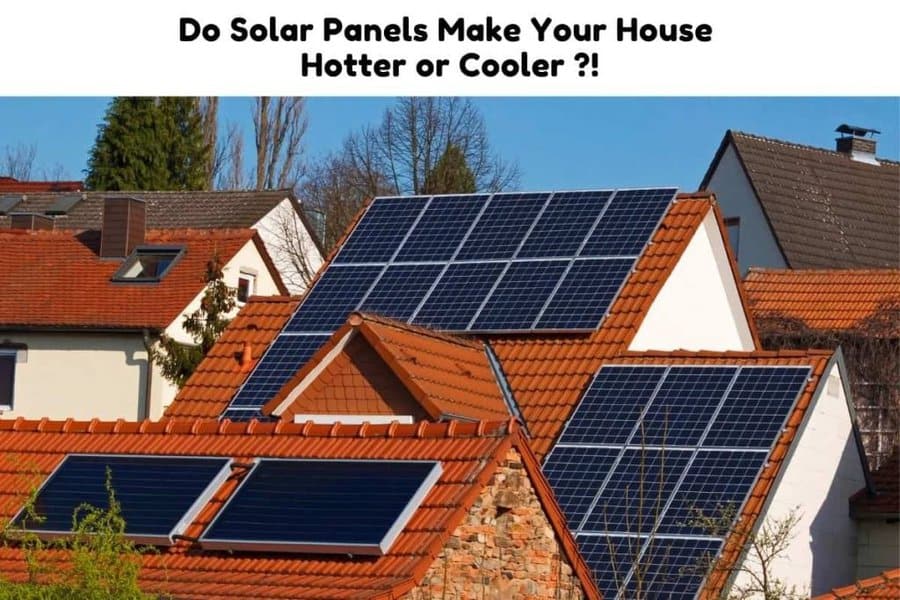A roof can get as hot as 150 degrees Fahrenheit or more on a hot summer afternoon. That heat gets transferred from your roof through the ceiling or attic before it spreads through and raises the temperature in the rest of the house.
Cooling and heating take up to 40% of your energy bill. Finding natural ways to cool your home like planting trees to provide shade can reduce your energy bill.
Not too many people know this but solar panels can also help reduce your energy bill indirectly by cooling your home. This is because solar panels have a slight cooling effect on homes where they are installed.
But how does this work exactly?
On a side note! If you’re in need of a reliable and high-performance portable solar panel, We strongly recommend the Jackery SolarSaga 100W Portable Solar Panel (Amazon Link).
With a high conversion efficiency and foldable design, this solar panel is easy to transport and set up, making it perfect for outdoor activities like camping, hiking, and RV trips.

The US solar cell technology used in this panel ensures that you get the most efficient and reliable solar charging possible.
There is also a 60W option that is more affordable (Amazon Link)
That is the question we want to explore. Do solar panels make your house hotter or cooler and how does this work?

Do Solar Panels Insulate Your Roof?
Solar panels insulate your roof though not by a large degree. Solar panels can make your roof slightly cooler in the summer and a little warmer in winter. They do this by shading your roof and preventing heat loss.
In winter the solar panels will trap the heat that accumulated during the day and prevent it from escaping at night. This is partly because solar panels absorb and produce a little heat energy themselves. Solar panels can get up to 36 degrees Fahrenheit warmer than the air around them. (Source)
The heating effect of solar panels is however very minimal. Most of the heat is carried away by air currents as soon as it starts to get cooler at night so don’t replace your heating just yet. In truth, solar panels have a larger effect on cooling than heating a roof.
Do Solar Panels Cool Your Roof?
Studies show that solar panels have a minor cooling effect on roofs. Solar panels can reduce the temperature of a roof by as much as 5 degrees Fahrenheit in the summer.
Most of the heat, especially on poorly insulated buildings, enters through the roof. When the sun is shining your roof is directly absorbing over 1,000 watts of energy. Darker roofs will absorb up to 90% of this energy. Lighter-colored roofs reflect up to 85%. If you want your roof cooler, paint it a lighter color! (Source)
Another way you can reduce the temperature on your roof is if you get solar panels. But how do solar panels cool a roof?
Cooling through absorption
Solar panels can reduce the amount of heat absorbed by your roof by as much as 38%. This was revealed in a study done by researchers in California. The study was carried out over three days and sought to measure the effect of solar panels on building temperatures.
Using thermal imaging and infrared cameras they measured the ambient temperatures of buildings with solar panels. The findings of the study were that ceiling temperatures of roofs under solar panels were lower than those with exposed roofs.
Solar panels have an anti-reflective coating which gives them a dark blue or black tint. This dark color allows them to absorb more light and heat than the surfaces around them.
Cooling through shading
By reducing the exposure of your roof to the sun, solar panels shade the roof. On a hot day, you are much cooler in the shade. This goes for your roof as well.
Instead of the roof being in direct sunlight it is shaded by the solar panels. How much shade is created will depend on how much surface area of the roof is covered by solar panels. The more panels the less surface area exposed.
Cooling through convection
When solar installers use mounting to attach your solar panels to the roof it creates a small gap between the roof and the solar panels. This gap can be as much as 6 inches wide. The gap creates a small cooling area.
A small convection current is created between the roof and the solar panels in which the warmer air is drawn toward the back of the solar panel while the cool air sinks toward the roof. Hot air rises while cool air sinks.
Cooling through efficiency
Solar panels with a higher efficiency like crystalline silicon solar panels will have an increased cooling effect. Monocrystalline solar panels at between 18 to 24%, are the most efficient crystalline solar panels. The more efficient a solar panel is the less heat it gives off. Heat is a by-product of the conversion of light into energy. (Source)
Less efficient solar panels like thin-film solar panels will give off more heat so there will be a slightly reduced cooling effect compared to a crystalline silicon solar panel.
The combination of absorption, shading, convection, and efficiency creates a slight reduction in the surface temperature of a roof. This reduction is carried through to the rest of the building leading to a slightly cooler building than one without rooftop solar.
For more on this topic, check out our post Do Solar Panels Keep Your Roof Cool?
Does the Type of Solar System Matter?
Solar systems are either grid-tied or off-grid. In a grid-tied system, you are connected to your power utility whereas in an off-grid system you are relying entirely on solar for all your electricity. Off-grid solar systems tend to use more solar panels so it could be said that homeowners with an off-grid system will see a more cooling effect.
Which Is Warmer To Touch, a Solar Roof Cool More Conventional Roof?
A solar roof will absorb more light energy than a conventional roof because that is what it is designed to do. Solar panels reduce the absorption in a roof and are slightly raised from the surface of the roof.
These two factors mean that with a solar roof there is more absorption and less heat loss through convection currents. That would make a solar roof hotter than a conventional roof.
On a side note, check out How Many Solar Panels / Heaters to Heat a Pool? Does It Really Work!
How Does Roof Design Affect the Cooling of Your Home?
A lighter roof will reflect light and absorb less heat than a darker one.
The material used also plays a part. Not only are metal roofs easier to install solar panels on, but it turns out they are also the best at maintaining cooler temperatures in a home.
Also, check out Does Solar Increase Home /Property Value? (What You Need To Know! )

